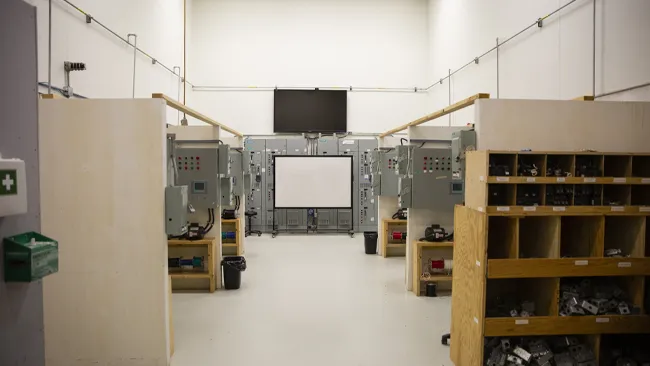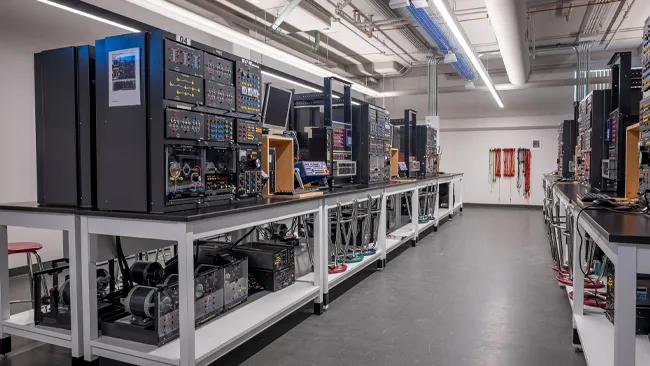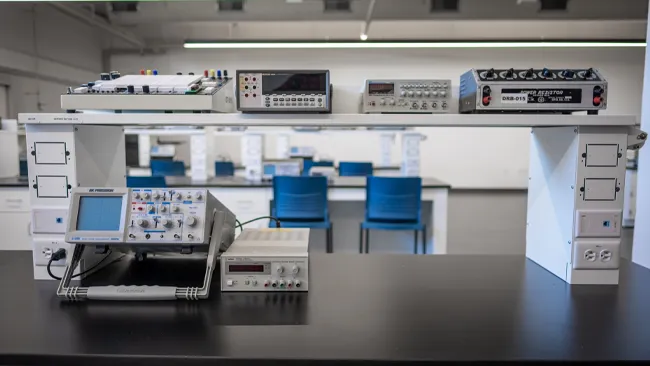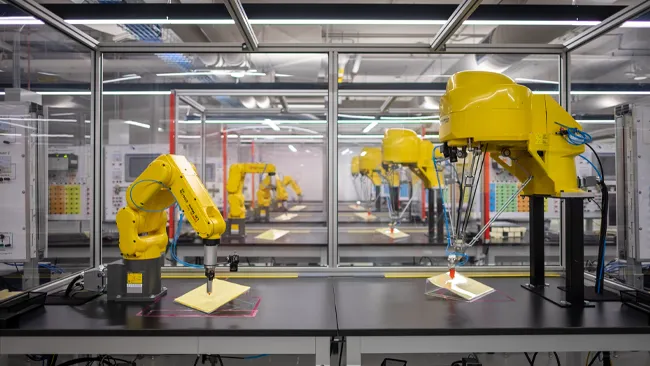
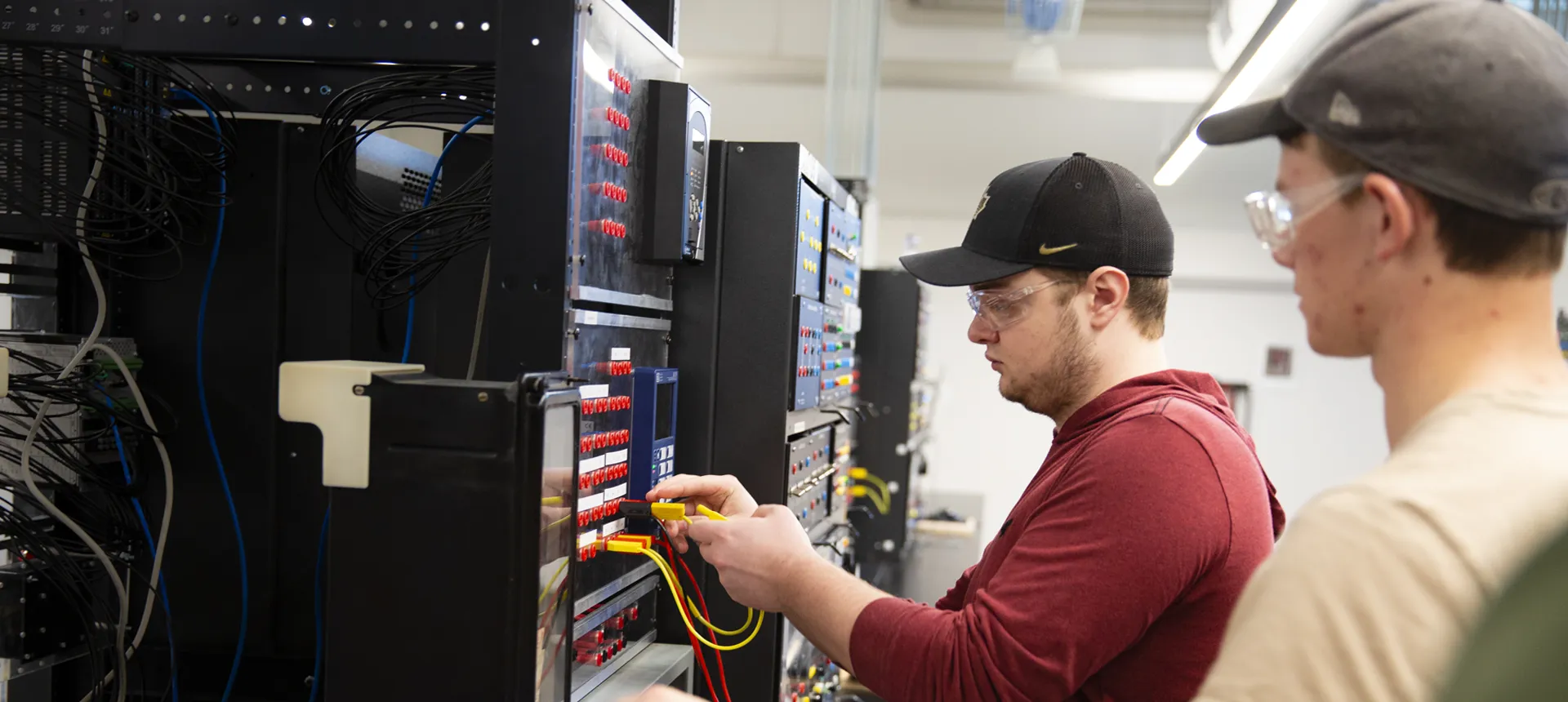
Electrical Engineering Technician - Power Distribution & Control
Overview
Are you interested in how electricity works and how to control it? Discover a rewarding and exciting career in the electrical field.
With more reliance on electricity and electrically powered devices, there is a greater need for skilled electrical workers with a wide variety of electrical experiences and knowledge. Lambton College's Electrical Engineering Technician - Power Distribution & Control program prepares students for a career in the rewarding and extensive electrical field.
Working both in the classroom and in various lab and shop settings, students gain practical, hands-on experience along with strong theoretical training in electrical fundamentals.
This program teaches students how electricity works, how to wire and program PLCs, control strategies, power generation, distribution and protection, the wiring of residential, commercial and industrial circuits, interpreting electrical codes, and how electronics and instrumentation devices are used in today's high-tech world, along with many other electrical tasks.
The optional co-op provides students with the opportunity to gain important electrical experience and in many cases, co-ops are the beginning of a rewarding, full-time career. There are many student success stories of graduates extending their co-op into a full-time career. This course diversifies the student, and includes: automation control, project management, and the distribution and control of power.
Women in Technology & Trades
Discover how Lambton College's Women in Technology & Trades (WiTT) group is empowering women to excel in technology and trades.
Visit our WiTT page for more information on mentorship opportunities, events, and resources designed to support your journey in these dynamic fields.
Learn More
Admission Requirements
O.S.S.D. or equivalent with:
- Grade 12 English C or U
- Grade 12 Mathematics C or U
- Grade 11 or 12 Physics C or U (recommended)
Grade 12 Mathematics Requirement
Grade 12 Mathematics for College Technology or any grade 12U mathematics is recommended; Grade 12 Foundations for College Mathematics (MAP4C) minimum final grade is 60%. If the program is highly competitive, students with Grade 12 Mathematics for College Technology or any Grade 12U mathematics will be given preference.
Mature Student Assessment for this program is available in the subject of English for the purpose of demonstrating proficiency in this required admission subject. For all other admission requirements, applicants must complete the required course(s) as listed above. For more information, please contact counselling@lambtoncollege.ca. Review the Mature Student Admission process.
Academic admission requirements can be obtained through Academic Upgrading and the Pre-Technology & Trades (PTEC) program at Lambton College.

Flexible Pathways Between Programs
The first year curriculum for both Electrical Techniques (ELTC) and Electrical Engineering Technician (PDCT) is identical. If you successfully complete the first year of the PDCT program, you have the option to apply for the ELTC certificate.
This flexibility allows you to customize your education and boost your career prospects.
Costs
- Year 1 $4,634.34
- Year 2 $4,548.42
Please Note: These fees apply to the 2024-2025 academic year and are subject to change. Fees do not include books (unless specifically noted), supplies or living costs.
Additional Fees
-
Safety Shoes$250.00
-
Safety Glasses$20.00
-
Calculator$25.00
-
TagOut Lock$20.00
-
Tool Kit *$325.00
*Tool Kit Includes
- Linesmen Pliers - High leverage 9" side cutting pliers
- Side Cutters
- Needle Nose Pliers
- Tongue and Groove Pliers
- Slot Screwdriver
- Terminating Slot Screwdriver - 2.5 mm - 3 mm width
- Philips Screwdriver - #2
- Two Robertson Screwdrivers - sizes red and green
- Measuring Tape
- Wire Strippers
- Knife - no utility knives allowed
- Torpedo Level - short 9" or so
- Claw Hammer
- Safety Lock
Scholarships Available
There are 9 scholarships available for this program, with a total value of $1,000!
Technology Requirements
In order to keep pace with the requirements of each and every course in your program, Lambton College requires that each student have access to a laptop while studying at our college.
Labs & Equipment
Courses
Basic Electrical Installations I
The student will develop a general knowledge of the operation of common hand and power tools; install common switching devices, outlets and enclosures, GFCI and AFCI circuits, as well as three and four way lighting circuits. All installations well be performed to the CEC and the student will correctly terminate conductors and demonstrate the application of non-metallic sheathed and armoured cable. The student will demonstrate the skills required to install a complete residential consumer's service. They will properly bend and install both EMT and Rigid conduit.
Electrical Theory
This course covers the explanation of the fundamentals of electrical theory, from the molecular structure of matter to the laws that govern the calculation of current, voltage and power in DC circuits. Topics will include the relationships between voltage, current, resistance and power including Ohm's and Kirchhoff's laws. Calculations will be made on series, parallel and combination circuits and current flow and power consumption in 2 and 3 wire systems. Circuits will be wired safely and measurements taken using digital multi-meters. As well, the course will include an introduction to alternating current AC.
Safety & Electrical Code I
This course will focus on the Canadian Electrical Code regulations and the application of those regulations as they pertain to electrical installations in residential dwellings as well as commercial units. The student will learn to navigate through the Canadian Electrical Code and interpret sections including Wiring Methods, Conductors, Installation of Electrical Equipment and Protection and Control.
Workplace Communications
This course focuses on skills required in any organization or position: writing business documents, responding to realistic scenarios, and speaking in an organized and vibrant manner. Students will practice professional and inclusive communications skills by producing, revising, and editing short business documents and engaging in verbal interactions and presentations.
Fundamentals of Instrumentation I
This is an introductory course in process instrumentation and safety. Topics will include WHIMS and an introduction to industrial hazards, Job Safety Analysis, and Work Permits. Basic instrumentation and control loop concepts, instrument signalling, wiring, and calibration techniques will be studied. Pressure measurement will be covered in greater detail. The reading and interpretation of Process and Instrumentation Diagrams will be addressed. The laboratory component will expose the student to the correct use and operation of calibration devices, pressure sensors and measuring instruments.
Mathematics for Electrical Circuits
This course reviews and develops topics in basic computation, measurement, algebra, geometry, trigonometry, and linear functions, emphasizing their electrical applications.
Electrical Systems Applications
This course is designed to extend the student's knowledge and experience into the areas of single-phase AC as well as DC systems. Resistive-reactive DC and AC circuits, power factor correction, DC motors and generators and single phase AC transformers are studied. Emphasis throughout the course is on problem solving. These concepts are supported and reinforced in the laboratory portion of the course.
Electronic Devices & Applications
This course covers an explanation of the fundamentals of electronics from digital logic to the operation of basic semiconductor devices in DC and AC circuits. Topics will include logic gates, Boolean algebra, flip-flops, P-N junction diodes, LEDs, transistors, thyristors, opto-couplers and operational amplifiers. The student will apply his/her knowledge of these devices in practical circuits such as dimmers, variable frequency drives and programmable logic controllers.
Industrial Installation Practices
In this course the student will gain the ability to read, interpret, and create electrical schematics related to motor control. The installation and operation of common controls used in industry including Stop-Start, Jog, Forward/Reverse, and speed control via variable frequency drives will become part of the student's skill set. An introduction to the wiring and programming of Programmable Logic Controllers will complete the student's industrial control knowledge. In addition students will gain the ability to interpret drawings and install conventional fire alarm system class A and class B circuits. Students will become familiar with different fire alarm devices along with their uses and operation.
Introduction Programmable Logic Controllers
Upon successful completion, the apprentice will be able to describe the basic operation of a PLC including numbering systems, programming, and addressing requirements, as well as perform testing of PLC inputs and outputs. The student will also be able to demonstrate basic PLC programming including common relay instructions such as timers and counters to design programs to operate machines in a required manner using many of the internal functions of a PLC.
Code & Prints
Upon successful completion, the student will be able to navigate and apply sections of the Canadian Electrical Code (CEC) including determining code requirements and performing calcuations for a residential service, maximum circuit loading, and motor branch circuits. The student will also be able to interpret and use information provided from drawings, specifications and standards, as well as create drawings and schedules for residential electrical installation and maintenance.
General Education Elective
Control Systems Architecture & Data Communications & Control
This course is an introduction to industrial process control systems, hardware architecture, and industrial data communications. Techniques and tools utilized for troubleshooting process control loop problems, and data communication systems are examined. The need for Instrumented Safety Systems is investigated and various system architectures are examined and evaluated using traditional qualitative and quantitative analysis techniques. Laboratory exercise involve the programming of traditional operator interfaces, implementing, integrating, and troubleshooting industrial communication systems, safety instrumented systems, and processes.
Introduction to Transmission & Distribution of Electric Power
This is an introductory course on electric power generation, transmission, distribution and utilization focused on industrial, commercial and residential sites. Students will learn about the construction and the properties of the foundational elementary components as well as how the components interface in order to deliver electrical power to the level of quantity and quality required by the electrical utilities and the end user. Students will learn how to analyze electrical power components and related circuits to determine their operational behaviours and will also learn how to specify components to suit system requirements. Basic knowledge of complex numbers and trigonometry will be utilized throughout this course.
Introduction to Industrial Control & Protection
The course focuses on the application of equipment used in any industry to safely and consistently utilize electrical systems at the device level. The course will discuss the safe utilization (lock out tag out) of motor control centres, programmable logic controllers, human machine interfaces, variable frequency drives, and soft starts. Students will interpret, compare and troubleshoot electrical drawings directly to the hardware associated with the labs. Final projects will test the students ability to design and implement electrical control strategies and will be graded based on completion.
Mathematics for Technology I
This course reviews and develops concepts in algebra, trigonometry, complex numbers, and vectors with technical applications.
Job Search & Success
This course provides student with skills and knowledge to help support their career search and succeed in the workplace. Students align their personal skill set and goals to guide them on their career paths. They will learn how to effectively conduct a job search, build a professional and well-tailored resume and cover letter, and develop and practice interview techniques. Students will also develop their personal brand to help support effective career networking and aid in their job search. Teamwork and collaboration in the workplace are also discussed. Self-reflection is used to inspire insight and support their professional career journey.
General Education Elective
Programmable Logic Control
An integrated lecture/laboratory course where learners are introduced to the fundamentals of programmable logic control design. Applications of programmable logic controllers are stressed. This course will allow the learner to study control systems which use discrete components and continuous/analog systems operated in well defined sequential steps to bring about a desired result. Using the unique control features afforded by PLC's, and by judicious application of PLC fundamentals, the learner will also demonstrate an ability to bring process systems under control.
Project Management
This course will provide the student with an overview of the structured processes and knowledge areas of project management within the context of organizations. It will contrast the differences between operational management and project management. It will provide the student with numerous tools and techniques used to initiate, plan, execute, monitor and control, and close a project. Students learn the vocabulary, definitions, principles and concepts of project management and working in a project team.
Introduction to Protective Relays
This is an introductory course on power protection and associated application in residential, commercial and industrial electrical systems. Students will practice voltage drop, fault and short circuit current calculations in single and three phase systems in industrial applications. They will also learn how to estimate protection devices ratings in accordance with the Canadian standards.
Electrical Metering
This course is an introduction to various types of electrical metering devices. The student will gain the ability to identify, select and safely use electrical meters to measure various electrical quantities. The student will further their ability by commissioning electrical equipment through measurement, trouble shooting problems with their circuits, and creating accurate measurement circuits.
Application of Power Electronics
This is a course on the application of switching power devices such as transistors, thyristors like silicon controlled rectifiers and new emerging semiconductor power electronics modules. The application of these various devices will be studied in renewable energy conversion systems, power supplies including uninterruptable power supplies and variable speed drives.
General Education Elective
Co-op Work Term (optional)
Co-operative education provides students with the opportunity to apply classroom learning to the workplace, undertake career sampling and gain valuable work experience that may assist students in leveraging employment after graduation.
Contact
Program Information
Applied Science, Engineering Technology & Trades
After Graduation
Employment Opportunities

Job opportunities in the Electrical Engineering Technician - Power Distribution & Control field have been steadily increasing. To survive in today's global market economy, industry must draw from a pool of technically competent engineers, technologists, technicians, and skilled trades people.
Graduates of this program have the skills to compete in a wide variety of industries including power generation, distribution and utilization, industrial telecommunications, electrical maintenance and installation, and control systems.
Co-op
About Co-op
Students in this program have the opportunity to gain valuable work experience by applying classroom learning during co-op experiences.
Learn more about co-op terms and the roles and responsibilities of students and co-op advisors.
More Information
Technology Requirements
It is recommended that students purchase a laptop with a Windows operating system.
Internet Speed Requirements
For best performance for students learning remotely, an internet connection with a minimum of 40 Mbps download and 10 Mbps upload speed is recommended in order to effectively use video conferencing and remote lecture delivery software as well as, other online resources remotely. Due to the large area over which students may be dispersed, we are unable to recommend a specific provider, so you will need to inquire around your area to find one that best suits your needs.
Minimum Laptop Requirements
In order to access the internet and virtually-delivered software and courseware, student laptops should include the following at a minimum. By meeting the following specifications, students will be equipped to access software and courseware on their laptop through the internet:
- Intel i5 8th Gen Processor or equivalent
- 16 GB of RAM (with a minimum of 8 GB)
- 100 GB HDD or more
- HD Graphics
- Webcam with a microphone
- Wireless 802.11n/ac 5ghz capable
- Windows Operating System (Windows 11)
Please note that Chromebooks and MacBooks may not support all software required for your program; students should verify compatibility with their professors.
Software
To ensure students are getting the most our of their classroom experience, some software will be required.
Lambton College has made this software easily accessible online. Students can leverage our Microsoft Office 365 software packages and services. In addition, much of the software you require for your courses will be available on demand for use on any device - on or off campus.
